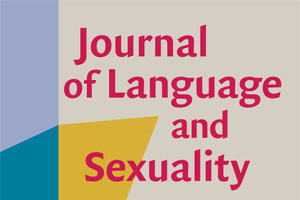Research
Understanding Language and Sexuality

Anthropology professor Bill Leap has dedicated much of his professional career to understanding the fundamental links between language and sexuality. Whether it is understanding the power of language in relation to sexuality-based bullying or the vocabulary used to describe types of people in relation to their sexuality, Leap knows that linguistics and sexuality are intricately bonded. In the pursuit of understanding this bond more thoroughly and helping others do so as well, this year Leap cofounded the Journal of Language and Sexuality with Professor Heiko Motschenbacher of Goethe University in Frankfurt, Germany.
The journal, which is the first to be published solely on the topic of language and sexuality, came out of Leap’s and Motschenbacher’s interactions at AU’s Lavender Languages Conference. The annual conference was founded by Leap 19 years ago as a forum for understanding the connection between language and sexuality and to bring together language and sexuality scholars from around the world to study this new and unique field. “Other journals might take a paper on language and sexuality,” says Leap. “But there was no guarantee these articles would be published or that they would get anything besides just a casual read.”
After attending the conference, Motschebacher decided to start the journal and looked to Leap as a senior scholar and partner in the journal. “Working on this journal is consistent with everything that I’ve always tried to do with the Lavender Languages Conference and in training students in the subject,” says Leap.
The journal will meet the needs of this field, which came into popular study just in the past few decades. “Ten or twenty years ago, language and sexuality simply didn’t exist as a field of inquiry,” says Leap. But as academia has progressed, the interest in this topic has expanded greatly. “There’s now an international need for a journal that can bring together the work that people are doing on the subject in one place.”
The journal will cover a variety of topics connected to language and sexuality including queer inquiry. “Language and sexuality work builds on a queer framework,” says Leap. “Queer inquiry was a major impetus in orienting what language and sexuality studies are about. But part of language and sexuality studies looks at things such as forms of masculinity, which is something that has not traditionally been covered in a journal dedicated to something like feminist linguistics.”
The journal’s first edition, which came out in early March, featured articles from scholars around the world. In her article “Teens’ Explorations of Gender and Sexual Identities in Conversations About/Around Preferred Texts,” Margaret Berg of the University of Northern Colorado examines the speech of students in the young adult section of a Midwestern public library. “The practices of teens in the library complicate popular and scholarly discourse that constructs teens as peer-oriented, hormonally-controlled, and transitioning into adulthood,” says Berg. “Their practices illustrate savvy, individual choices that allow teens to subvert the heterosexual norms of the adult controlled schools. The close connection between literacy choices and identity implies a need for educators to advocate for adolescents’ access to their preferred texts.”
Deborah Chirrey of Edge Hill University in the United Kingdom looks at the content of advice texts for those coming out as lesbian, gay or bisexual in her article, “Reading the Script.” According to Chirrey, “the selection, elaboration, support, and opposition of particular scripts formulates coming out as a rational, positive, and emancipatory action for an LGB individual to undertake.”
Leap says that it’s important to pay attention to language and sexuality, rather than only language and gender because sexuality cannot be fully explained by reference solely to gender. “The issues of gender studies are assumptions of power and how those issues are implemented and circulated,” says Leap. “Sexuality is the study of how people transgress, manipulate, and work around these assumptions.”
The Journal of Language and Sexuality is available for paid personal or library subscriptions both in online and print formats. A free copy of the first issue can be obtained online by clicking on the table of contents tab.